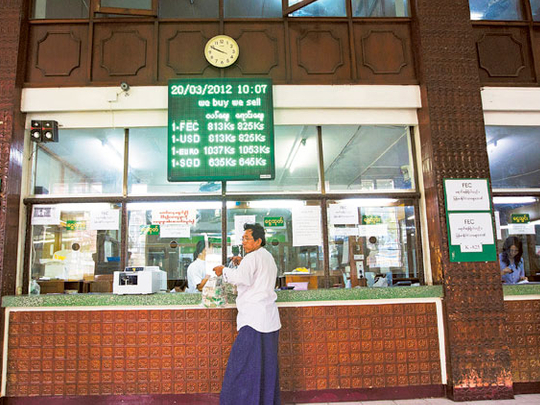
Singapore: A benchmark index tracking Asian currencies held near a three-month high amid speculation policymakers in the world’s biggest economies will boost efforts to combat a global slowdown.
Stock markets in South Korea and Taiwan attracted $4.5 billion (Dh16.5 billion) from abroad last week as Germany backed an European Central Bank (ECB) bond-buying plan that may alleviate the region’s debt crisis. Japan’s economy grew less than economists predicted in the second quarter, data showed today, and figures due tomorrow are forecast to show the euro area’s gross domestic product (GDP) declined.
“Investors aren’t selling any more as most of the bad news on global growth has been priced in,” George Pu, a bond trader at Sinopac Securities Corp. in Taipei, said.
The Bloomberg-JPMorgan Asia Dollar Index, which tracks the region’s currencies, was little changed at 115.47 as of 12.54pm in Hong Kong. It touched 115.73 on Thursday, the highest level since May 15. Thailand’s baht and the Singapore dollar climbed 0.1 per cent to 31.44 per dollar and S$1.2449, respectively. South Korea’s won slipped 0.1 per cent to 1,131.35 and India’s rupee weakened 0.2 per cent to 55.375. Indonesia’s rupiah strengthened 0.1 per cent to 9,485.
Federal Reserve Bank of San Francisco President John Williams said in an interview with the San Francisco Chronicle that the central bank should begin a third round of bond purchases amid signs growth is slowing, the newspaper reported on Friday. China’s leaders pledged to keep adjusting policies to ensure stable economic expansion this year, the official Xinhua News Agency reported on July 31.
Bank of England Governor Mervyn King said in an article in the Mail on Sunday that the euro area crisis has “no obvious end in sight.”
Japan growth below expectations
Japan today reported an annualised 1.4 per cent growth for last quarter that was slower than the 2.3 per cent pace economists predicted in a Bloomberg News survey.
The 17-nation euro region’s GDP probably declined 0.2 per cent in the second quarter from the previous three months, according to a separate survey before data due tomorrow.
“Risk appetite is improving on hopes the ECB will eventually take some action,” Tommy Ong, a senior vice president of treasury and markets at DBS Bank (Hong Kong) Ltd, said.
The rupiah gained after Bank Indonesia said it was taking steps to curb Indonesia’s widening current account deficit. The central bank announced on Friday that overseas investors can hedge their foreign exchange transactions for as short as one week from three months previously.
“The regulations should be positive for the rupiah,” Veni Kriswandi, head of traded risk at PT Bank Commonwealth in Jakarta, said. “Bank Indonesia is providing all kinds of means to hedge when people want to invest in financial markets.”
The yuan gained 0.02 per cent to 6.3586 per dollar in Shanghai, according to the China Foreign Exchange Trade System. The People’s Bank of China lowered its daily fixing 0.01 per cent to 6.3456, the weakest level since November.
Elsewhere, Malaysia’s ringgit and the Philippine peso were little changed at 3.1187 per dollar and 41.893, respectively. Vietnam’s dong was steady at 20,850.












